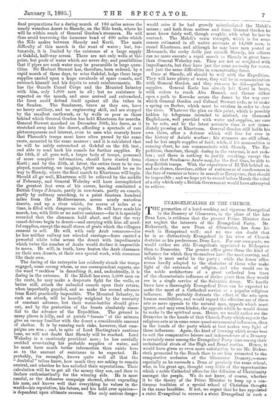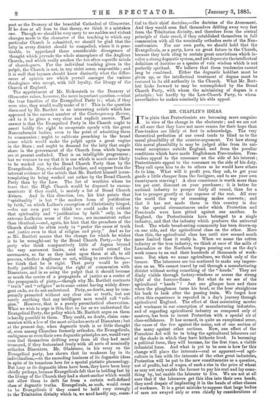EVANGELICALISM IN THE CHURCH.
THE promotion of a hard-working and vigorous Evangelical to the Deanery of Gloucester, iu the place of the late Dean Law, is evidence that the present Prime Minister does not neglect the interests of the Evangelical Party. Mr. Bickersteth, the new Dean of Gloucester, has done his work in Hampstead well ; and no one can doubt that he is as distinctively Evangelical in his view of Church doctrine as his predecessor, Dean Law. For our own parts, we would rather see able Evangelicals appointed to Bishoprics than to Deaneries. The greater office gives them the kind of influence for which they themselves have the most craving, and which is most useful to the party ; while the lesser office seems hardly adapted to the character of those who make light of the externals of religion, and who would see in the noble architecture of a great cathedral less trace of the characteristic influence of divine grace than they would see in a single service of the Salvation Army. We hardly know how a thoroughly Evangelical Dean can be expected to make the most of a Cathedral service as a popular religious influence. He probably distrusts the effect of the arts upon human sensibilities, and would regard the effective use of these arts as mere appeals to the natural man, appeals which must ignore, and may even hinder, the appeals which he would desire to make to the spiritual man. Hence, we would rather see the Deaneries in the hands of that Church Party which regards the religious arts as in some sense quasi-sacramental influences, than in the hands of the party which at best makes very light of those influences. Again, the kind of learning which seems best to suit the comparative leisure and independence of a Deanery is certainly rarer among the Evangelical Party than among their ecclesiastical rivals of the High and Broad parties. Hence, it would have given us even more satisfaction to see Mr. Bickersteth promoted to the Bench than to see him promoted to the comparative seclusion of the Gloucester Deanery,—more especially as he succeeds a Dean of precisely the same school, who, in his great age, thought very little of the opportunities which a noble Cathedral offers for the diffusion of Christianity amongst the people. We do not know, of course, whether it be the theory of the Prime Minister to keep up a continuous tradition of a special school of Christian thought in the same localities. If not, we regret that he has appointed a strict Evangelical to succeed a strict Evangelical in such a
post as the Deanery of the beautiful Cathedral of Gloucester. If he does at all lean to that theory, we think it a mistaken one. Though we should be very sorry to see sudden and violent changes made in the character of the teaching to which any particular Church is submitted, we should be glad that the laity in every district should be compelled, where it is prac ticable, to apprehend those considerable divergences of thought which pervade the whole atmosphere of the Anglican Church, and which really awaken the too often soporific minds of church-goers. For the individual teaching given in the pulpit, the Church is not, in any strict sense, responsible ; and it is well that laymen should know distinctly what the differ ences of opinion are which prevail amongst the various theologians who accept, with full loyalty, the liturgy of the Church of England.
The appointment of Mr. Bickersteth to the Deanery of Gloucester raises, however, the more important question,—what the true function of the Evangelical Party is ; what, if they were wise, they would really make of it ? This is the question discussed by Mr. Bartlett in an interesting article which has appeared in the current number of the Contemporary Review, and to it he gives a very clear and explicit answer. That answer is that the Evangelical Party in the Church ought to assert boldly the right to co-operate openly with the great Nonconformist bodies, even to the point of admitting them to communion ; ought to cultivate preaching in the broad sense which would make the pulpit again a great engine in the State ; and ought to demand for the laity that ample share in the government of the Church from which laymen are at present excluded. That is an intelligible programme ; but we venture to say that it is one which is much more likely to be worked out by the Broad Church Party than by the Evangelicals. Nay, we should go further, and suppose from the internal evidence of the article that Mr. Bartlett himself is contemplating its being worked out rather by the Broad Church Party than by the Low. The list of worthies whom he fears that the High Church would be disposed to excommunicate if they could, is mainly a list of Broad Church
divines. And in this direction, too, his hint points that " spirituality " is but " the modern form of justification by faith," on which Luther's conception of Christianity hinged, —for our own part we think we could make it evident that spirituality and " justification by faith " only, in the extreme Lutheran sense of the term, are inconsistent rather than identical,—and, again, his hint that the preachers of the Church should be often ready to "prefer the cause of truth and justice even to that of religion and piety." And so far as Mr. Bartlett means that the change for which he wishes is to be wrought-out by the Broad Church Party,—by the party who think comparatively little of dogma beyond the very narrowest limits, and who would extend the sacraments, so far as they insist upon them at all, to all persons, whether Anglicans or not, willing to receive them,— we think that he is right. That party would be perfectly justified in claiming the right of communion with Dissenters, and in so using the pulpit that it should become as much the centre of a propaganda of justice as a centre of the propaganda of piety.—though why Mr. Bartlett contrasts " truth" and " religion "as to some extent having widely divergent ends, we do not understand. Piety, no doubt, may be temporarily promoted without any clear aim at truth, but not surely anything that any intelligent man would call "religion." However, that is a purely parenthetical observation. What we wish to urge is this, that so far as we understand the Evangelical Party, the policy which Mr. Bartlett urges on them is hardly possible to them. They could, no doubt, claim communion with a few of the most orthodox sects of Dissenters ; but at the present day, when dogmatic truth is so little thought of, even among Churches formerly orthodox, the Evangelicals, ambiguous as even their own dogmatic principles are, would very soon find themselves drifting away from all they had most treasured, if they fraternised freely with all sorts of nominally orthodox Dissenters. Mr. Gladstone, in his essay on the Evangelical party, has shown that its weakness lay in its individualism,—in the exceeding haziness of its dogmatic ideas in spite of its tenacious love for a special pietistic phraseology. But hazy as its dogmatic ideas have been, they have been hazy chiefly perhaps, because Evangelicals felt that in holding fast by the liturgy of the Church they had a sheet-anchor which would not allow them to drift far from a certain well-defined class of dogmatic truths. Evangelicals, as such, would cease to be Evangelicals if they ceased to hold very strongly to the Trinitarian divinity which is, we need hardly say, essen
tial to their chief doctrine,—the doctrine of the Atonement. And they would soon find themselves drifting away very fast from the Trinitarian divinity, and therefore from the central principle of their creed, if they established themselves in full communion with all the nominally orthodox sects of the Nonconformists. For our own parts, we should hold that the Evangelicals, as a party, have no great future in the Church, because they both cling to certain great convictions which involve a strong dogmatic system, and yet deprecate the intellectual definition of doctrine as a species of vain wisdom which is not perfectly spiritual. We believe that these tendencies cannot long be combined. Either the dogmatic holdfast must be given up, or the intellectual treatment of dogma must be restored to its old authority in the Church. What Mr. Bartlett looks forward to may be accomplished by the Broad Church Party, with whom the minimizing of dogma is a principle ; but hardly by the Low-Church Party, to whom nevertheless he makes nominally his able appeal.











































 Previous page
Previous page